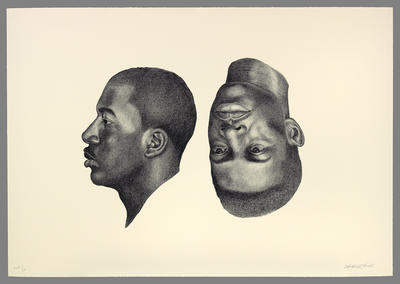 |
| Whitfield Lovell. Deuce, 2011. Lithograph printed in black on paper. © Whitfield Lovell. Courtesy of DC Moore Gallery, New York. |
This print by Whitfield Lovell was created at the Smith College Print Workshop in 2011 with the assistance of master printer Maurice Sanchez. Held annually in the Harnish Graphics Studio in Hillyer Hall, the Print Workshop brings together visual artists and master printers to collaborate on a limited-edition print. The general public is invited to observe the creative process, and students are given the opportunity to assist in the making of a print. Last year’s Print Workshop was held in conjunction with SCMA’s exhibition More Than You Know: Works by Whitfield Lovell (January 28 – May 1, 2011).
Born in the Bronx, Whitfield Lovell’s earliest experience making art was assisting his father, an amateur photographer, in the darkroom. Lovell’s drawings and prints are often worked up from the early twentieth century photographs of African-Americans he collects from flea markets, junk shops and estate sales. This double portrait of a man suggests the identification photographs Lovell often uses as models for his work—an unsmiling passport photograph or mug shot. The severe profile and frontal views also recall racist ethnographic photographs or illustrations of African-Americans. Although the images that Lovell plays on evoke restriction and oppression, Lovell’s gorgeously rendered print lends dignity and a sense of personal identity to another otherwise anonymous face.
Whitfield Lovell’s portraits investigate the ways in which human identity is represented and perceived. While an identification photograph frames identity or personhood in terms of membership in social groups, Lovell insists upon viewing identity in individualistic terms. The identity of the man in Deuce is fundamentally mysterious and irreducible. That said, Lovell does provide some clues as to the identity of his subject. The title Deuce, which refers to the double view of its subject, can also refer to the two in cards or dice. This secondary meaning is reinforced by the inversion of the second head in the print, recalling the pictures or symbols on playing cards. Deuce can also mean bad luck or mischief—it’s an old-fashioned curse word (“a deuce on him!”). Is this man the trouble maker, or the one in trouble?
**Currently not on view but available to view by appointment in the Cunningham Center for the Study of Prints, Drawings, and Photographs. **
No comments:
Post a Comment